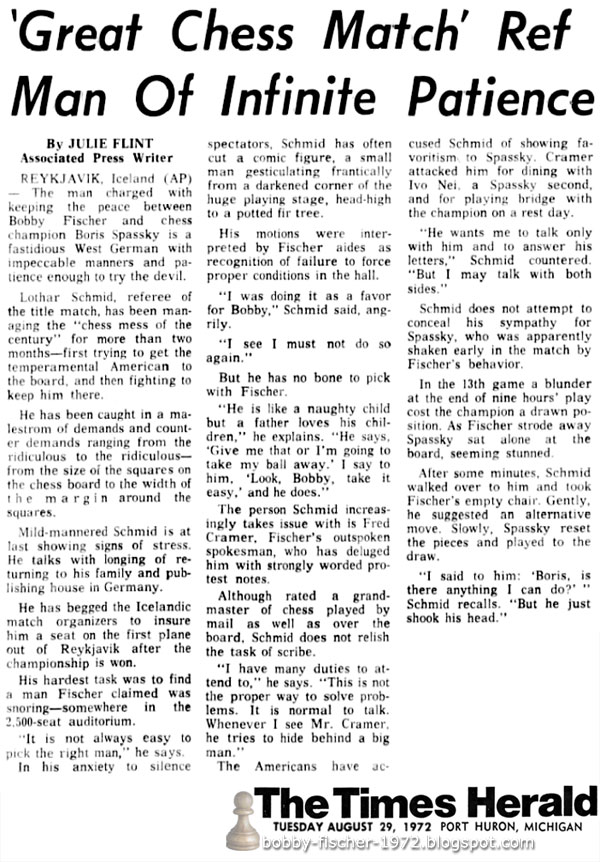The Times Herald Port Huron, Michigan Tuesday, August 29, 1972 - Page 19
'Great Chess Match' Ref Man Of Infinite Patience
By Julie Flint, Associated Press Writer
Reykjavik, Iceland (AP) — The man charged with keeping the peace between Bobby Fischer and chess champion Boris Spassky is a fastidious West German with impeccable manners and patience enough to try the devil.
Lothar Schmid, referee of the title match, has been managing the “chess mess of the century” for more than two months—first trying to get the temperamental American to the board, and then fighting to keep him there.
He has been caught in a maelstrom of demands and counter demands ranging from the ridiculous to the ridiculous—from the size of the squares on the chess board to the width of the margin around the squares.
Mild-mannered Schmid is at last showing signs of stress. He talks with longing of returning to his family and publishing house in Germany.
He has begged the Icelandic match organizers to insure him a seat on the first plane out of Reykjavik after the championship is won.
His hardest task was to find a man Fischer claimed was snoring—somewhere in the 2,500 seat auditorium.
“It is not always easy to pick the right man,” he says.
In his anxiety to silent spectators, Schmid has often cut a comic figure, a small man gesticulating frantically from a darkened corner of the huge playing stage, head-high to a potted fir tree.
His motions were interpreted by Fischer aides as recognition of failure to force proper conditions in the hall.
“I was doing it as a favor for Bobby,” Schmid said, angrily.
“I see I must not do so again.”
But he has no bone to pick with Fischer.
“He is like a naughty child but a father loves his children,” he explains. “He says, ‘Give me that or I'm going to take my ball away.’ I say to him, “Look, Bobby, take it easy,’ and he does.”
The person Schmid increasingly takes issue with is Fred Cramer. Fischer's outspoken spokesman, who has deluged him with strongly worded protest notes.
Although rated a grandmaster of chess played by mail as well as over the board, Schmid does not relish the task of scribe.
“I have many duties to attend to,” he says. “This is not the proper way to solve problems. It is normal to talk. Whenever I see Mr. Cramer, he tries to hide behind a big man.”
The Americans have accused Schmid of showing favoritism to Spassky. Cramer attacked him for dining with Ivo Nei, a Spassky second, and for playing bridge with the champion on a rest day.
“He wants to to talk only with him and to answer his letters,” Schmid countered. “But I may talk with both sides.”
Schmid does not attempt to conceal his sympathy for Spassky, who was apparently shaken early in the match by Fischer's behavior.
In the 13th game a blunder at the end of nine hours' play cost the champion a drawn position. As Fischer strode away Spassky sat alone at the board, seeming stunned.
After some minutes, Schmid walked over to him and took Fischer's empty chair. Gently, he suggested an alternative move. Slowly, Spassky reset the pieces and played to the draw.
“I said to him: ‘Boris, is there anything I can do?’” Schmid recalls. “But he just shook his head.”
























